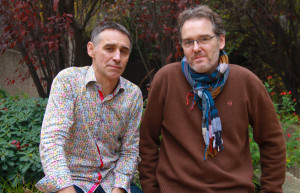Bertrand Geay et Xavier Thierry
tell us about an unprecedented study of child learning at the nursery school level in France. Run by the ELFE (French Longitudinal Study of Children) research team, the study will be conducted in spring 2016 in nearly 9,000 schools.

Bertrand Geay, assistant director of the ELFE research team and head of the Groupe Ecole section of the project, is professor of educational sciences at the University of Picardie, where he runs the CURAPP (Centre Universitaire de Recherches sur l’Action Publique et le Politique), a CNRS-funded research laboratory. His sociology research is on child socialization, schooling policy, and unionism and collective action in the area of education.
Xavier Thierry, a demographer and INED researcher, has been an ELFE team member since 2010. He is involved in setting up and assesses ELFE annual surveys while coordinating the social science teams studying demographics, socialization, economics, development and diet, as well as the Groupe Ecole, where the new follow-up stage in the cohort child study was developed.
(Interview December 2015)
What scientific questions are driving this nursery school-based survey?
Let me first recall that the French Longitudinal Study of Children (ELFE) is a national representative study of 18,000 children being followed from birth to the age of 20. ELFE was launched in 2011.
In connection with the ELFE cohort’s entry into nursery school, the team has arranged to collaborate with nursery schools throughout France to study child learning as a whole at the age of 4; specifically, interactions between family and school socialization. There has never been a far-ranging study in France of relations between children’s earliest experiences (first ties with parents, grandparents, child-minders, respective upbringing or educational styles) and the process of becoming integrated into nursery school (preschool learning, cognitive development, socialization).
Parents’ consent is required for questioning or directly studying children. How are you managing this?
All families participating in the ELFE survey were initially contacted in the maternity hospitals when their child was born. All gave written consent to participate and are being kept informed of the study’s scientific findings. ELFE children will be 5 years old in 2016. Their nursery school teachers will be asked to determine their preschool learning levels in accordance with a precise protocol. In concrete terms, after receiving parental consent, the teachers will fill out a questionnaire on individual preschool pupils and have them do a few playful exercises related to early learning content in groups of four: the ELFE child and three other randomly selected nursery school pupils. Parents have already been informed of these proceedings; teachers will be informed in January. The data will be collected from April to June 2016. First findings will of course be transmitted to the parents.
What types of information are going to be collected about such young children?
Teachers will assess ELFE children by means of a questionnaire on the child’s specific acquisitions and development; there will also be sections on class and teacher characteristics. The exercises done by the children themselves will cover preschool learning in French (recognizing sounds and letters, oral comprehension) and numbers (identifying collections, recognizing numbers, counting).
While guaranteeing confidentiality and personal data security, ELFE has one sole purpose: to study the individual trajectories of a sample of children throughout metropolitan France. Nearly one in four nursery schools will be involved.
What’s new about this research project?
In contrast to National Education Ministry studies of panels of pupils already in elementary school, the ELFE study has been collecting precise information on children’s lives since birth. This particular study was designed in cooperation with the National Education Ministry and the French Education Institute. It recalls the ambitious study of “pupils’ intellectual level” conducted at INED in 1965, with its sample of 120,000 children age 6-13, a study that Pierre Bourdieu drew on. Researchers were already inquiring at that time into social and family inequalities! Fifty years later, with the ELFE child cohort study, we are turning to teachers to help produce data on child socialization and development.
